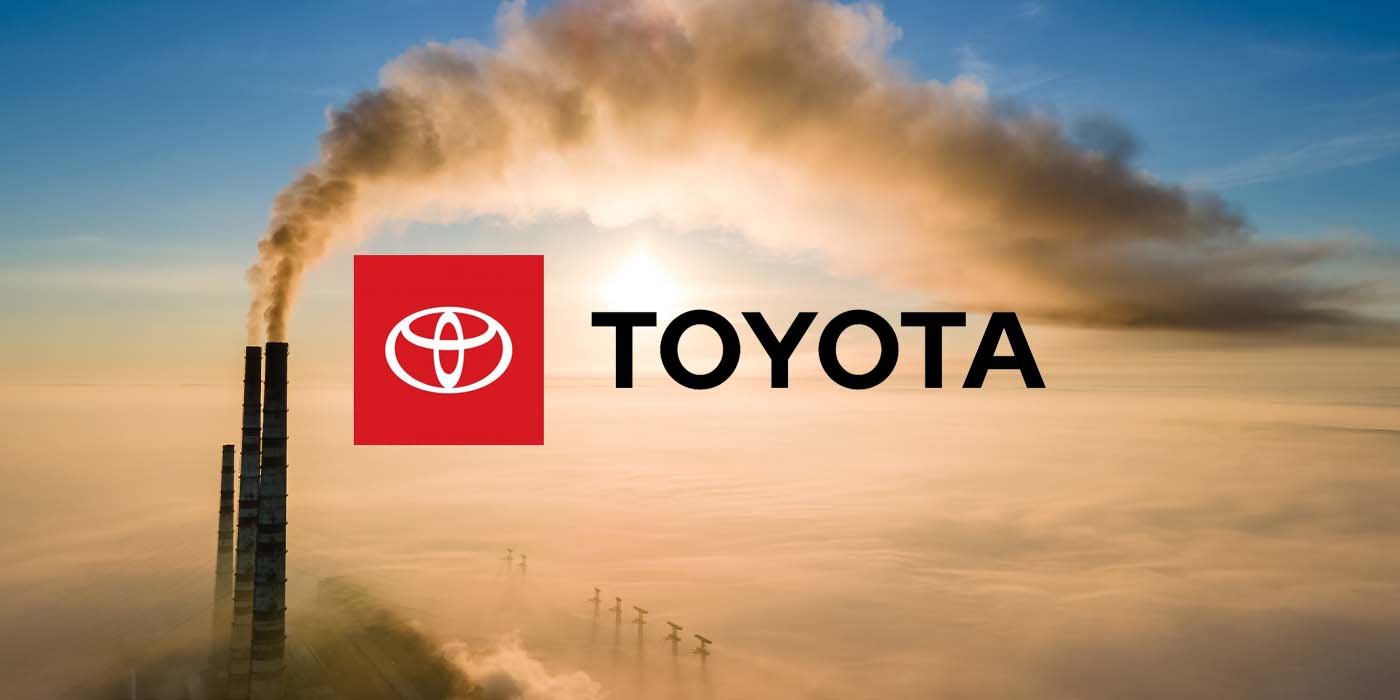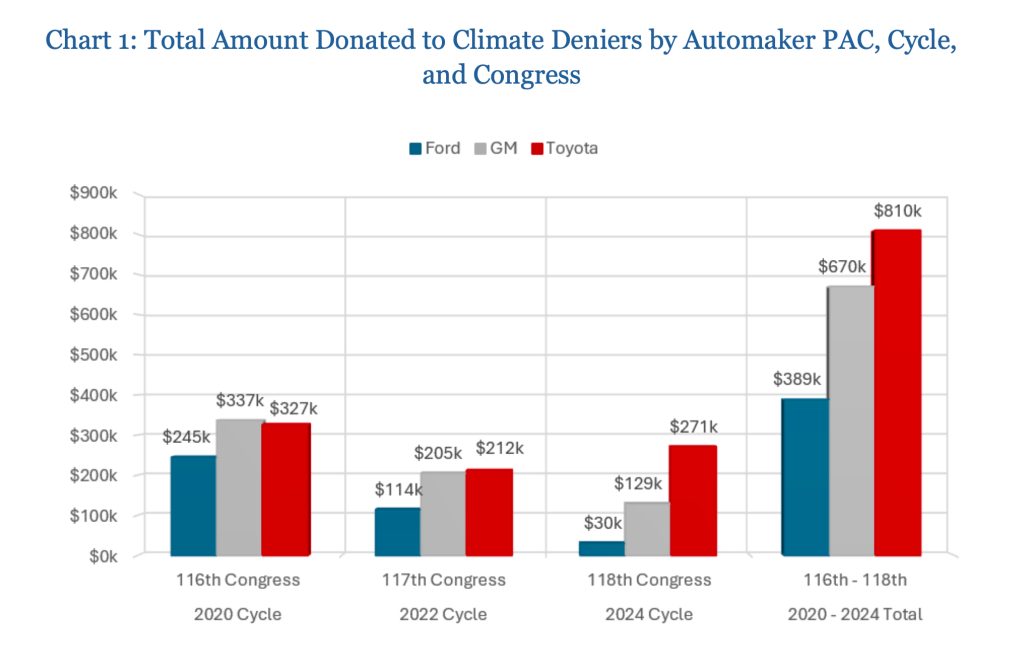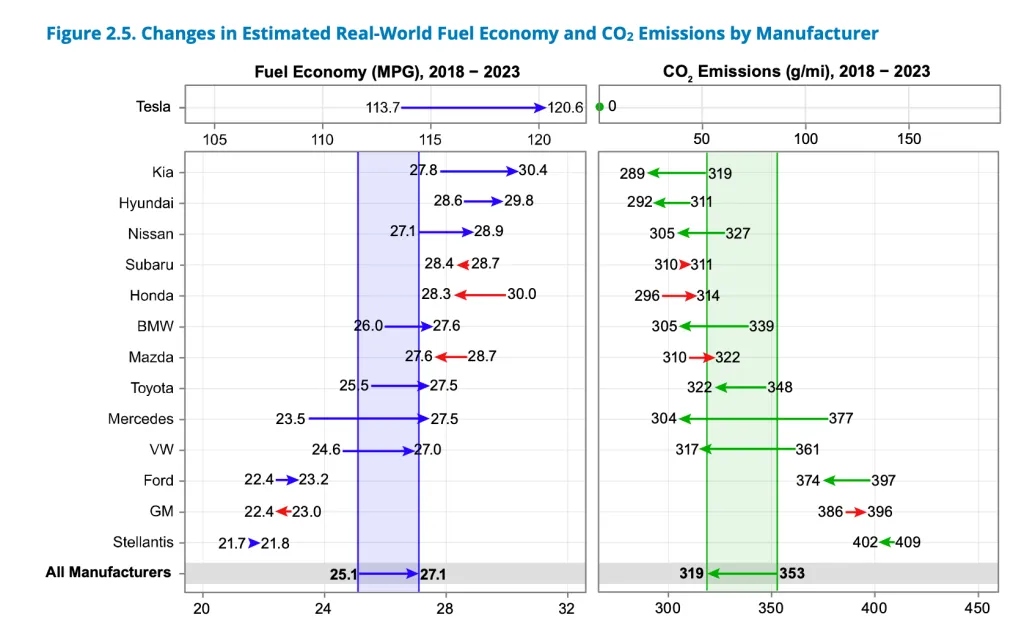
Toyota has been revealed as the largest auto industry funder of climate deniers in US Congress, according to a report released today by Public Citizen.
Toyota is the largest automaker in the world, having occasionally competed for that title with Volkswagen. It sells more gas-powered, polluting vehicles than any other company on Earth, and thus, it has a vested interest in continuing to sell those polluting vehicles.
But the problem is that gas-powered, polluting vehicles are not good for the health of humans or other living beings on this planet.
The pollution created by gas-powered vehicles damages every organ in the body, kills millions of people per year, and is a primary driver of climate change which is already causing an uptick in natural disasters (as we see currently, with climate change-fueled fires destroying 12,000 structures in the last week in the US’ second-largest metro area) and threatens to displace over a billion people.
But that truth is inconvenient to Toyota, whose global revenue from selling polluting vehicles exceeds $300 billion/year. That means that, as one of the richest companies in the world and thus one of the most well-positioned to fund a transition to cleaner vehicles, it has a choice: it can either better itself, or it can do nothing to improve and instead pay people to lie about the problems that its vehicles are causing.
As you might expect, it has chosen the latter.
Toyota ranked as a top pollution advocate, once again
Toyota has repeatedly ranked as one of the strongest funders of pro-pollution, anti-EV, and climate denying propaganda in the world, and a new report out today reveals its growing interest in seeding anti-science attitudes in US Congress, through political bribes to climate deniers.
Public Citizen’s report, “Driving Denial: How Toyota’s Unholy Alliance with Climate Deniers Threatens Climate Progress,” analyzes political donations from US auto industry PACs over the last three election cycles, and shows that not only is Toyota the largest funder of climate denial, but that Toyota’s funding of climate denial is increasing, while others are decreasing.
(Notably, the report only covered company-linked automaker PACs, specifically Toyota, Ford and GM, and donations to Congressional candiates. Tesla CEO Elon Musk did set up his own PAC, and his bribes to anti-EV and climate denying candidates vastly outpaced all of the aforementioned PACs combined).
Public Citizen analyzed public records of political donations and past statements by US Congressmembers. It expanded its definition of “climate denier” from previous reports, this time including members who “used other rhetorical tactics like climate doomism (saying there is nothing that can be done), portraying climate activism as alarmism, and who downplayed the need to act to address climate change.”

It found 169 candidates – unsurprisingly, all are republican – who had worked to deny scientific truths about climate change over the course of the last three election cycles. Out of those 169 candidates, Toyota donated some amount of money to 143 of them, totaling $810k.
In just the most recent cycle, it found that Toyota gave $271,000 combined to 62 candidates, nine times as much as Ford and more than twice as much as GM gave. Both Ford and GM’s climate denial donations reduced over the last three cycles, while Toyota’s dipped in 2022 and rose in 2024.
These bribes are relatively small dollar numbers compared to Toyota’s >$300 billion in global annual revenue, and it’s money that has gotten results.
How this lobbying affects your lungs and pocketbook
In March of 2024, President Biden’s EPA finalized a new exhaust rule that will save thousands of lives and save Americans over $100 billion in fuel and health costs per year, and reduce climate pollution by 7 billion tons – but lobbying from the auto industry, including Toyota, got those rules softened before they were implemented.
The rest of the auto industry also asked for that softening of the rules, but there is now an opportunity for them to go further. Unfortunately for America, the next occupant of the White House is convicted felon Donald Trump, who finally received more votes than his opponent on his third attempt (despite committing treason in 2021, for which there is a clear legal remedy).
Mr. Trump has stated quite forcefully that he wants to reverse President Biden’s money-saving clean air policies, thus saddling Americans with dirtier air, higher costs and poorer health. This turnaround would also send American jobs to China and attempt to quash the new boom in American manufacturing driven by Biden’s EV rules.
In the past, the auto industry has taken advantage of changes in government, trying to get money-saving clean air rules torpedoed even after implementation.
This time, though, the auto industry is begging that the rules remain in place (after realizing they screwed everything up last time) in order to provide regulatory certainty to an industry with long planning timelines.
But Toyota has broken with the rest of the industry, instead asking the new Congress – that it bought – to give tax credits to its polluting gas-powered vehicles, which harm your health and exacerbate natural disasters.
Toyota’s “green image” is long overdue for a change
Toyota has long rested on the laurels of its previous success with hybrid vehicles, hoping that customers would be fooled into thinking that it is an environmentally responsible company because it sold some vehicles that make slightly less pollution than others for a while.
But conventional hybrid vehicles like the Prius (non-plug-in version) are still gas-powered, and still get 100% of their energy from gasoline. The vehicle’s hybrid drive only works to recover kinetic energy that’s already in the system and redeploy it, increasing efficiency, but still relying entirely on a resource that absolutely, without question, must stay in the ground.
And while Toyota has sold a significant amount of hybrids, the brand still ranks below average in efficiency, according to the EPA automotive trends report. It ranked below all other Asian brands, and below BMW, a brand famous for its large-engine and high-performing sportscars (though ahead of the US Big Three, which sell a lot of disgustingly huge vehicles and need to do better).

This is incongruous with Toyota’s perception among the public, which still consider the company as a green leader despite its long-time advocacy, as covered above, against EVs, against clean air regulations, and in favor of climate denial.
Toyota also portrays itself as a green leader through numerous greenwashing campaigns and anti-science disinformation. Public Citizen recently filed an FTC complaint over Toyota’s false electrification claims.
But is all of this effort to be hostile to life on Earth helping Toyota? Probably not – and it might even know it.
Toyota’s EV intransigence is harming it – and all of Japan
While Toyota’s advocacy could be interpreted as an attempt to protect its profits, this is a short-sighted view.
All industries change, and companies that do not change along with their industry are doomed to failure.
Toyota, itself, was the harbinger of this change in the 1970s, when the auto industry went through a big shakeup due to disruption in the oil and steel industries. Consumers needed smaller and more efficient vehicles that were not being provided by US automakers, and Toyota and other Japanese automakers – which also had superior manufacturing techniques and access to better and cheaper steel – swooped in to provide them.
Despite US attempts at protectionism (which didn’t work then and won’t work now), this catapulted Japan to becoming the world’s top auto exporter, and Toyota remains a global powerhouse.
However, now Toyota and Japan are on the opposite side of this lesson. Worldwide, consumers are demanding electric vehicles at increasing rates, and Toyota not only refuses to provide them, but tries to channel customers to its polluting vehicles instead.
The situation got so bad that the company’s longtime CEO, Akio Toyoda, stepped down in 2023 due to his failure on EVs, but the new CEO Koji Sato didn’t change much.
But someone else is providing the EVs consumers want – namely, China. As a result, China overtook Japan as the world’s largest auto exporter in the last year or so. And Toyota’s business is cratering in the world’s largest auto market because Chinese consumers just don’t want their crappy gas cars. Toyota is even losing ground in its home country, as domestic brand EV sales drop, and foreign brands grow.
So the roles are reversed now – China is the new Japan, and Japan, led by Toyota (the largest company in the country, with high political and cultural influence) is responding in just the way that will ensure the same outcome as the last time this happened.
As EV sales grow globally, any company that does not keep pace will find its position diminished. Toyota has shown no interest in keeping pace, and instead is trying to lobby to stop a transition that will happen whether it likes it or not.
And it won’t just harm Toyota, but the entire country of Japan, for which automotive products make up around a fifth of its exports. Japan is reliant on the auto industry, and its intransigence could lead to a huge drop in GDP if it doesn’t shape up.
Top comment by Jeff L.
Their hybrids were on my short list for my most recent purchase, but they'll probably never get my consideration again.
Sad, as they could have ran with the Prius momentum and dominated the BEV space.
But instead of looking at all this blatant evidence that its intransigence will harm it, Toyota is doubling down on climate denial instead of trying to catch up with an industry that has clearly left it in the dust. nd Toyota seems determined to drag the US down with it, through these political bribes.
While Toyota’s short-term lobbying victories may feel good in the moment, they will help neither the company, the health of the humans who work for it who have to deal with the increased pollution its leadership lobbies for, nor the health of the planet it exists on which will be harmed by the science denial it lobbies for.
If you’re an electric vehicle owner, charge your car at home with rooftop solar panels. To make sure you find a trusted, reliable solar installer near you that offers competitive pricing on solar, check out EnergySage, a free service that makes it easy for you to go solar. They have hundreds of pre-vetted solar installers competing for your business, ensuring you get high-quality solutions and save 20-30% compared to going it alone. Plus, it’s free to use and you won’t get sales calls until you select an installer and share your phone number with them.
Your personalized solar quotes are easy to compare online and you’ll get access to unbiased Energy Advisers to help you every step of the way. Get started here. – ad*
FTC: We use income earning auto affiliate links. More.





Comments